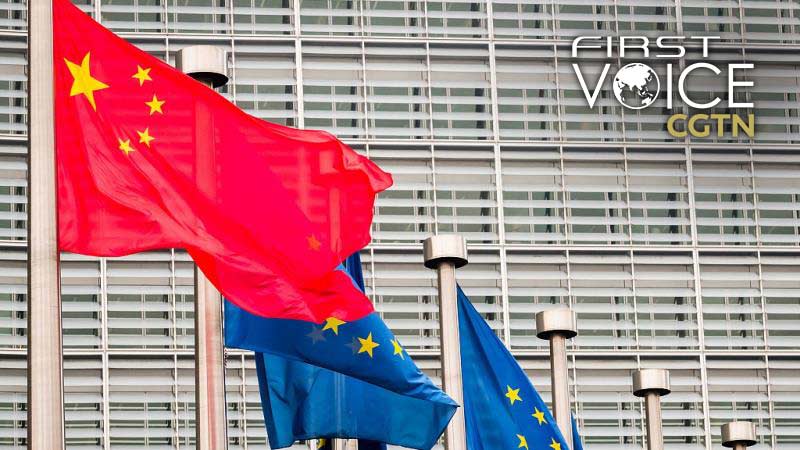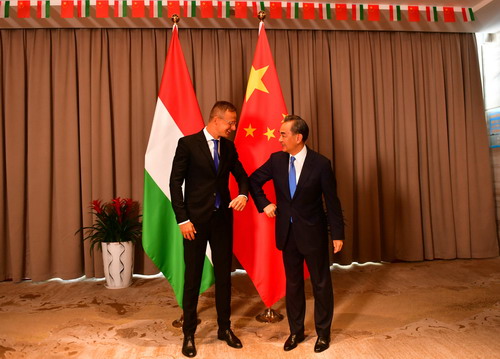
Editor's note: CGTN's First Voice provides instant commentary on breaking stories. The daily column clarifies emerging issues and better defines the news agenda, offering a Chinese perspective on the latest global events.
Hungarian Minister of Foreign Affairs and Trade Peter Szijjarto pledged to deepen cooperation with Beijing during his official trip to China's Guangxi Zhuang Autonomous Region this week. As the first European foreign minister to visit China since the outbreak of COVID-19, Szijjarto's trip demonstrates profound Beijing-Budapest ties and is of symbolic significance to restoring China-Europe cooperation in the post-pandemic era.
At a time when certain Western politicians are shouting decoupling from China, China and European countries have been striving to intensify cooperation and prevent disruptions in the normal operation of supply chains. And China-Hungary interactions have set a model for international collaborations.
China is Hungary's second most important source of imports, and has invested more than 5 billion U.S. dollars in the country, Szijjarto reportedly said. China's role cannot be underestimated in Hungary's fight against COVID-19 either. The world's manufacturing powerhouse has delivered more than 90 million masks, 40 million protective suits and 800,000 doses of medication to Hungary during the pandemic, according to the minister.
In the meantime, Budapest is the first in Europe to sign an intergovernmental cooperation accord with Beijing over the Belt and Road Initiative. The country has been playing an active role in modernizing the rail track between Budapest and Belgrade in recent years, an attempt to offer quicker route for China-Europe trade. Apart from the BRI, Hungary has been zealously pushing forward the China-Central and Eastern European Countries cooperation.

Chinese State Councilor and Foreign Minister Wang Yi and Hungary's Foreign Minister Peter Szijjarto pose for a photo in Beihai, Guangxi Zhuang Autonomous Region, China, August 24, 2020. /China's Ministry of Foreign Affairs
Chinese State Councilor and Foreign Minister Wang Yi and Hungary's Foreign Minister Peter Szijjarto pose for a photo in Beihai, Guangxi Zhuang Autonomous Region, China, August 24, 2020. /China's Ministry of Foreign Affairs
As strategic partners with strong political mutual trust, China and Hungary have never stopped boosting their bilateral relations and intensifying pragmatic cooperation. Against the backdrop of rising unilateralist sentiments in the West, this is inspiring for other European countries harboring stereotypes against China to get over the ideology-based prejudices and restore cooperation with the world's second largest economy.
Strengthened China-Europe ties are particularly vital in the post-pandemic era. China understands it. Following Szijjarto's China trip, Chinese State Councilor and Foreign Minister Wang Yi has embarked on his five-European nation journey. At a time when the United States is launching offensives against China on all fronts – banning Chinese tech firms, making waves on the Hong Kong, Tibet and Xinjiang issues, and making groundless accusations on the country's human rights conditions, Wang's trip is significant to strengthening international solidarity and boosting stability in global supply chain.
As Wang noted previously, China is the world's largest potential market. Enhancing ties with it means more market opportunities and more possibilities to satisfy domestic demand. At present, the EU remains as China's top trading partner, while China is the EU's second largest trading partner and biggest source of imports. These hard-won achievements must be cherished amid rising trade protectionist sentiments.
Since assuming office, U.S. President Donald Trump has been relentlessly advocating unilateralism. Under "America First" policy, a slew of anti-China American hawks have been calling for decoupling with China and forcing European countries to a pick side between Washington and Beijing.
Decoupling has no place in the era of global integration and normal economic activities should never be sabotaged by certain country's hegemonic acts. This is particularly true during the COVID-19 pandemic. The United States' experience in the pandemic proves that political virus is more deadly than the COVID-19, and any attempt to jeopardize international cooperation and upset market economy principles will ultimately harm those behind these unilateral moves.
Public interests should always be prioritized over selfish political calculations. Serving the people, not politicians, is why a government, be it capitalist or socialist, is established in the first place. European politicians have the wisdom to make the right choice between public interests and the need to court the United States. A number of European countries have warmly welcomed Wang's trip. The more challenging the international landscape, the more urgent is the need for China and Europe to intensify their ties.
Scriptwriter: Liu Jianxi
(If you want to contribute and have specific expertise, please contact us at opinions@cgtn.com.)